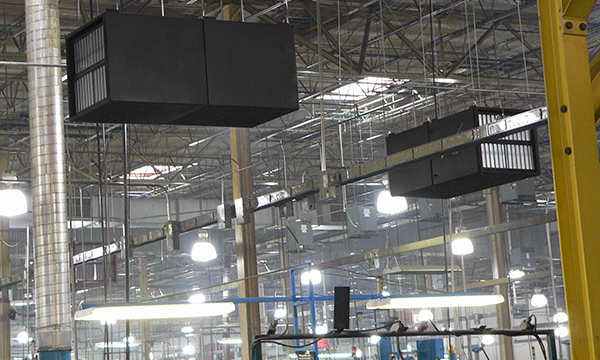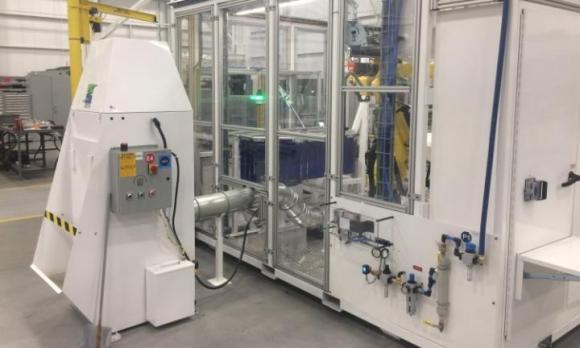Conductive Dust Removal | NFPA 660
Immersion systems are designed to neutralize the metal dust by submerging it in a liquid bath.

Ceiling Dust Collectors are unsafe for Titanium Dust
Ceiling Mounted Ambient Dust Collection Units are not meant for xp metal dust
NFPA 660 - Definitions:
3.3.15.1* Combustible Metal Dust. A combustible metal dust particulate solid, including combustible fibers/flyings, that presents a fire, flash fire, or explosion hazard when suspended in air or the process-specific oxidizing medium over a range of concentrations. (CMD-CMM)
3.3.15.2* Combustible Metal Particulate. See 3.3.15.1
3.3.15.3* Metal Dust. Metal Particulate resulting from a solid state secondary processing operation. (CMD-CMM).
3.3.16* Combustible Particulate Solid. Any solid material composed of distinct particles, regardless of size, or handled in the facility, has the potential to produce combustible dust. (CMD-FUN)
The Hazardous Dust Still Passes Through Your Breathing Zone
Ambient-style dust collection can pose serious risks when it comes to handling titanium dust. A simple search on "titanium dust cloud in machine shops" reveals the critical nature of airborne titanium particles. These particles are highly pyrophoric, meaning they can ignite spontaneously upon contact with air, potentially leading to a powerful explosion triggered by even a minor spark or heat source, including static electricity. Therefore, stringent safety protocols are essential when dealing with titanium dust in a machine shop setting. Titanium can affect you when inhaled. Contact can irritate the skin and eyes. Inhaling Titanium can irritate the nose, throat, and lungs. Titanium powder is FLAMMABLE and SPONTANEOUSLY COMBUSTIBLE.
Titanium Dust - Health Hazard Information
- Acute Health Effects The following acute (short-term) health effects may occur immediately or shortly after exposure to Titanium:
- Contact can irritate the skin and eyes. Inhaling Titanium can irritate the nose, throat and lungs causing coughing, wheezing and/or shortness of breath.
- Chronic Health Effects The following chronic (long-term) health effects can occur at some time after exposure to Titanium and can last for months or years:
- Cancer Hazard According to the information presently available to the New Jersey Department of Health, Titanium has not been tested for its ability to cause cancer in animals.
- Reproductive Hazard According to the information presently available to the New Jersey Department of Health, Titanium has not been tested for its ability to affect reproduction.
Titanium dust has a Kst value exceeding 300, far surpassing the explosivity level of polyurethane dust at 156 Kst. Despite these dangers, it's concerning to observe the use of ceiling-mounted Ambient Dust Collector systems in machine shops to manage titanium dust plumes. These installations are ill-suited for capturing explosive dust due to numerous inherent limitations.
Source-Capture Wet Collection is the Only Safe Means of Capture

We can guide you through the requirements of NFPA 660 (formerly 484) in finding the Dust Collection solution that is the most effective and productive. Conductive metal dusts are hazardous and they need expert analysis so that the correct solution is applied.